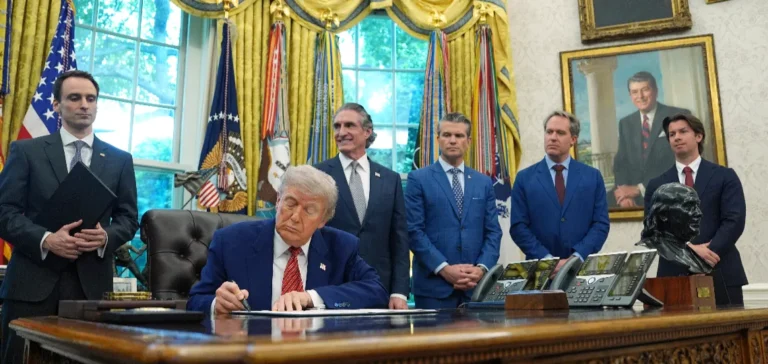The U.S. Department of Energy (DOE) has selected Oklo Inc. and its subsidiary Atomic Alchemy Inc. for three projects under the new Reactor Pilot Program. This federal initiative aims to demonstrate criticality in at least three test reactors before America’s 250th birthday on July 4, 2026. Oklo secured two projects while Atomic Alchemy obtained one, positioning the company at the heart of American nuclear strategy. These selections are part of an accelerated modernization context for the nuclear sector, made possible by executive orders signed in May 2025.
Jacob DeWitte, co-founder and CEO of Oklo, was present in the Oval Office of the White House during the signing of these orders by President Donald Trump, alongside Interior Secretary Doug Burgum, Defense Secretary Pete Hegseth, and Scott Nolan, CEO of General Matter. This presence underscores the strategic importance given to advanced nuclear actors in American energy policy. The program aims to accelerate deployment timelines while providing essential operational data to support long-term commercial licensing.
Strategic collaboration with Lightbridge Corporation
Parallel to these government selections, Oklo announced on August 11, 2025, a collaboration with Lightbridge Corporation (NASDAQ: LTBR) to explore the co-location of a fuel fabrication facility. This initiative is part of a memorandum of understanding signed earlier this year. Both companies are jointly assessing the feasibility of commercial-scale fuel fabrication within Oklo’s planned advanced fuel manufacturing infrastructure. The objective is to accelerate the commercialization of advanced nuclear fuels through joint fabrication and research and development activities.
The proposed co-located facility would support the production of advanced fuels for both fast reactors and light water reactors. This collaboration reinforces both companies’ commitment to U.S. leadership in advanced nuclear fuel manufacturing and recycling. Seth Grae, President and CEO of Lightbridge Corporation, emphasized that this joint effort reflects a shared vision for a modern nuclear fuel cycle, supporting both existing and advanced reactors while strengthening America’s energy resilience.
Financial results and development perspectives
Oklo published its second quarter 2025 financial results on August 11, accompanied by an updated investor presentation available on its investor relations website. The company held a conference call the same day with Jacob DeWitte and Craig Bealmear, Chief Financial Officer, to discuss these results. The company is currently developing fast fission power plants to deliver clean, reliable, and affordable energy at scale, while establishing a domestic supply chain for critical radioisotopes.
The company was the first to receive a site use permit from the DOE for a commercial advanced fission plant. It also obtained fuel from Idaho National Laboratory and submitted the first custom combined license application for an advanced reactor to the U.S. Nuclear Regulatory Commission. Oklo is also developing advanced fuel recycling technologies in collaboration with the DOE and national laboratories, including for manufacturing fuel using repurposed plutonium from legacy materials, in accordance with May 2025 executive directives calling for the Secretary of Energy to establish a program to process surplus plutonium.






















